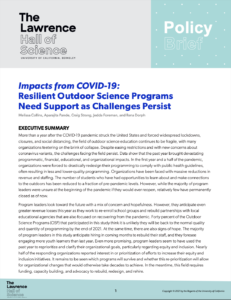February 8, 2022, Berkeley, California – Millions of children have missed out on enriching outdoor science education experiences since the start of the pandemic. That is the conclusion of a new policy brief released today by The Lawrence Hall of Science at the University of California, Berkeley that examines the impact of COVID-19 on outdoor science programs nationwide. The brief is a follow-up to a study originally conducted in 2020.
In April 2020, at the outset of the COVID-19 pandemic, the Lawrence Hall of Science conducted a survey of nearly 1,000 outdoor science program leaders from across the country. They were asked how the pandemic would affect their ability to offer crucial educational outdoor experiences. The survey led to some concerning projections: Among just the 1,000 programs responding (a fraction of those in the country), some 11 million learners would miss out on engaging outdoor education, 30,000 staff would be furloughed or fired, and the outdoor science organizations could lose nearly $600 million in revenue.
“These spirited and memorable programs are often the highpoint of students’ time in our K-12 schools,” says Craig Strang, Associate Director of Lawrence Hall of Science and one of the co-authors. “They accelerate science learning and promote health, well-being, and connection to nature. We saw right away that this crucial and often underappreciated component of our education system was at risk disappearing before anyone noticed.”
So to what degree did those projections come to pass? In April 2021, the authors reached out to The Better Environmental Education, Teaching, Learning, and Expertise Sharing (BEETLES) network of outdoor science programs, as a stand-in for the field at large, to see how they fared in the intervening year. The results showed an industry hit hard, with nearly two-thirds of respondents reporting closures in 2020. Program leaders also reported even higher revenue losses than projected, and millions of learners missed out on the opportunity to explore science outdoors. A large majority of these programs reported that pandemic restrictions led to a considerable decline in both the quality and quantity of the crucial experiences they offered. Most troubling is that the students missing out on programming are disproportionately students of color and those from low income communities, at precisely a time when outdoor learning could provide a small antidote to the other impacts of the pandemic.
Things are moving slowly for programs as they emerge from the strict lockdowns of 2020, though there are some signs of hope. Nearly 3/4 of surveyed OSPs report that they are now open, albeit with significantly reduced capacity due to the pandemic. The outlook for 2021 was a little brighter, with program leaders estimating a significant uptick in learners engaged this year over 2020. Still, “normal” is a long way off, as most organizations believe things will return to pre-pandemic business-as-usual within 2 to 5 years. Many resilient programs have weathered the storm, though they will need support if they are to survive 2 to 5 more years of pandemic economic stress.
The new policy brief outlines several steps that can be taken to ensure the survival of programs that have been significantly weakened by the pandemic. Among the recommendations is an increase in funding and capacity building as these organizations work to rebuild and rehire to pre-pandemic levels, and redesign their programs for the future. In addition, these resources should prioritize equity to address the needs of communities of color that were severely impacted by the pandemic. It is also critical to advocate for outdoor learning, promoting it as safe, engaging, effective, and essential.
“Kids need outdoor learning experiences now more than ever,” says Rena Dorph, director of the Lawrence Hall of Science and a co-author on the brief. “The benefits (cognitive, socio-emotional, and physical) of learning in outdoor settings are critical to today’s young people. Youth are suffering deeply from the learning consequences and mental health challenges of this pandemic. It is critical that policymakers and funders at every level invest in building a strong and lasting infrastructure so we forge a path towards a new normal that prioritizes outdoor learning experiences in ways that advance equity and environmental justice.”
This follow-up study of environmental and outdoor science education organizations was funded by the National Science Foundation and conducted in partnership with the California Environmental Literacy Initiative and Ten Strands—organizations that focus on bringing environmental education to all K-12 students.
Related Information
CONTACTS
Craig Strang, cstrang@berkeley.edu, (510) 882-6560
Adam Frost, Press Contact, Lawrence Hall of Science: newsroom@berkeley.edu

